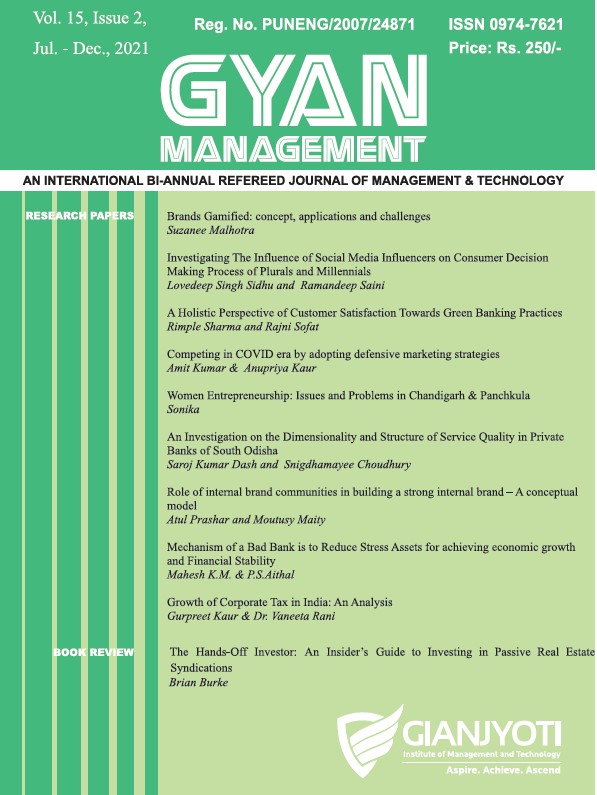EFFICIENCY IN INDIA: AN EMPIRICAL STUDY OF PUBLIC AND PRIVATE SECTOR
DOI:
https://doi.org/10.48165/gmj.2023.18.2.10Keywords:
Public Sector Banks, Private Sector, Economy, Data Envelopment AnalysisAbstract
This study delves into the Total Factor Productivity (TFP) growth of major Indian private and public sector banks from 2012 to 2022, employing the Malmquist Productivity Index and Data Envelopment Analysis (DEA). It scrutinizes TFP change, technical change, and efficiency change within the banking sector. Among public sector banks, approximately 58% exhibit positive productivity changes, contrasting with the increased productivity of private banks displaying 31.5%. Significant differences in TFP become evident, with Canara Bank ranking highest among public sector banks, achieving a TFP score of 1.059, while Punjab National Bank exhibits the lowest TFP, averaging at 0.948. In the private sector, Axis Bank emerges as the frontrunner with an average TFP of 1.145, whereas Tamil Nadu Mercantile Bank lags behind with an average TFP of 0.381. These findings furnish policymakers and stakeholders with crucial insights to formulate strategies aimed at bolstering the technical efficiency of both private and public sector banks in India, significant for the sector’s sustained growth and stability.
Downloads
References
Akeem, U. O. and Moses, F. (2014) ‘An empirical analysis of allocative efficiency of Nigerian commercial Banks: A DEA approach’, International Journal of Economics and Financial Issues, 4(3), pp. 465–475.
Cho, T. Y. and Chen, Y. S. (2021) ‘The impact of financial technology on China’s banking industry: An
application of the metafrontier cost Malmquist productivity index’, North American Journal of Economics and Finance, 57(December 2020), p. 101414. doi: 10.1016/j.najef.2021.101414.
Goyal, J. et al. (2019) ‘66’, Journal of Finance and Data Science, 5(3), pp. 156–172. doi: 10.1016/j. jfds.2018.08.002.
Himmawan, M. F. and Firdausi, N. A. (2021) ‘Projection of Indonesian Islamic commercial banks efficiency and stability in the Covid-19 period using DEA and panel ARDL’, Jurnal Ekonomi & Keuangan Islam, 7(1), pp. 17–30. doi: 10.20885/jeki.vol7.iss1.art2.
Kamarudin, F. et al. (2019) ‘Bank Efficiency in Malaysia a DEA Approach’, Journal of Central Banking Theory and Practice, 8(1), pp. 133–162. doi: 10.2478/jcbtp 2019-0007.
Krejnus, M. et al. (2023) ‘The Use of the DEA Method for Measuring the Efficiency of Electronic Public Administration as Part of the Digitization of the Economy and Society’, Applied Sciences (Switzerland), 13(6). doi: 10.3390/app13063672.
Muharrami, S. Al (2008) ‘An examination of technical, pure technical and scale efficiencies in GCC banking’, American J. of Finance and Accounting, 1(2), p. 152. doi: 10.1504/ajfa.2008.019950.
Patra, B., Padhan, P. C. and Padhi, P. (2023) ‘Efficiency of Indian Banks–private versus public sector banks: A two-stage analysis’, Cogent Economics and Finance, 11(1). doi: 10.1080/23322039.2022.2163081.
Sathye, S. and Sathye, M. (2017) ‘Do ATMs Increase Technical Efficiency of Banks in a Developing Country? Evidence from Indian Banks’, Australian Accounting Review, 27(1), pp. 101–111. doi: 10.1111/
auar.12110.
Ullah, S., Majeed, A. and Popp, J. (2023) ‘Determinants of bank’s efficiency in an emerging economy: A data envelopment analysis approach’, PLoS ONE, 18(3 March), pp. 1–17. doi: 10.1371/journal.
pone.0281663.
Veluthedan, S. P. and Kiran, K. B. (2023) ‘Digital Financial Services (DFS) and Productivity of Indian Banking Sector - Empirical Evidence Using Malmquist Productivity Index and Panel Data Regression’, Journal of Law and Sustainable Development, 11(9), p. e1697. doi: 10.55908/sdgs.v11i9.1697.
Wasiaturrahma et al. (2020) ‘22’, Heliyon, 6(7), p. e04390. doi: 10.1016/j.heliyon.2020.e04390.
Downloads
Published
Issue
Section
License
Copyright (c) 2024 Gyan Management Journal

This work is licensed under a Creative Commons Attribution 4.0 International License.



